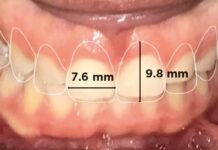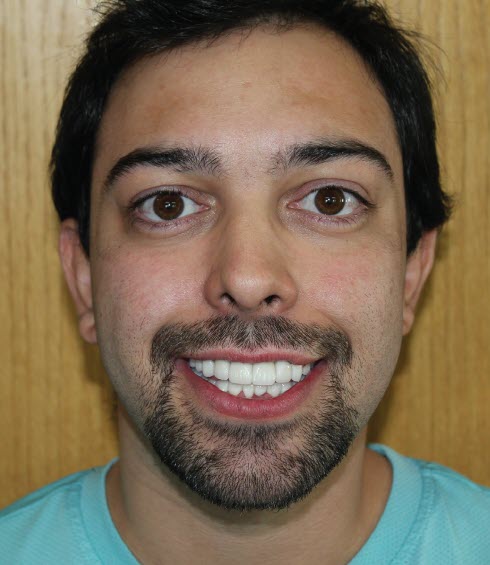
Ever since I became a dentist, I’ve wanted to donate a large case to someone in need. But I wasn’t sure how to go about it. Finally, a few years ago, my team and I devised a plan, and everything fell into place.
At Mile High Smiles, my practice in Lakewood, CO, we held a contest in which the winning entry received a total smile makeover. We made the contest available to entries from anyone in our surrounding area.
A SUCCESSFUL MARKETING CAMPAIGN
The first thing we did was get the word out—we needed to attract the most candidates possible. We reached out to a popular local morning radio show in our area, whose disc jockeys were patients at our office. They helped promote our contest on the air. We also sent out email blasts and posted the contest on social media outlets.
Ideally, we wanted a patient who truly needed a makeover. We stipulated that candidates could
nominate themselves or someone else who was deserving of a smile makeover as long as they completed an application and explained why the applicant needed it.
Candidates submitted applications through our practice’s website. Our web designer set everything up online, so it was easy to enter. Ultimately, we received more than 250 applications, which was a great response. We then asked an independent panel of judges to narrow down the candidates to five finalists.
Ultimately, we received more than 250 applications, which was a great response.
I asked each finalist to visit our practice and submit to a health assessment so that we could ensure they were healthy enough for treatment. The candidates came in not only for a dental assessment, but also a medical one. Fortunately, all the finalists were healthy enough for dental treatment and we administered a full, comprehensive dental exam and X-rays on each finalist.
Afterwards, we posted stories about each of the five candidates on our website. Then we asked the local radio station to drive interest by asking people to vote for their favorite candidate on our website. We also publicized our contest on our social media channels and via an additional email blast to garner as many votes as possible. The period of voting was held for about two weeks, the votes were tallied, and the winner received a $50,000 smile makeover from our office.
THE WINNING PATIENT
The winner was a young man in his mid-twenties (see photos on page 12). While he was growing up, this particular young man encountered some difficulties that affected his dentition. He was in a bike accident at a young age, and he hit the ground and knocked out (or at least severely chipped) his front teeth.
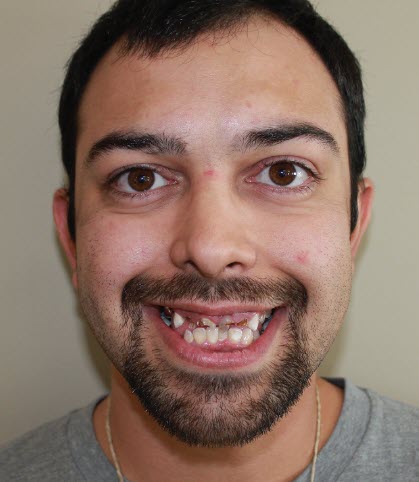
When he learned how much work needed to be done, it was overwhelming, so things kept deteriorating.
At the time, his parents weren’t able to afford dental care to fix his teeth, so the patient was bullied about them. He didn’t take care of his teeth very well because he was so ashamed of them. He had several untreated cavities.
As a result of his embarrassment, the patient didn’t smile, and he tried to hide his teeth. In the past, whenever he visited a dental office and learned how much work needed to be done, it was overwhelming, so things kept deteriorating.
TURNING THINGS AROUND
At the initial visit, we did a thorough assessment, which included evaluating the patient’s teeth, periodontium, occlusion, and temporomandibular joint (TMJ). Due to extensive decay, poor periodontal health, and missing teeth, a comprehensive approach to treatment was crucial. We took radiographs, intraoral photos, full mouth perio charting, and an occlusal analysis with the iTero™ intraoral scanner and T-Scan™ to assess the patient’s dental health.
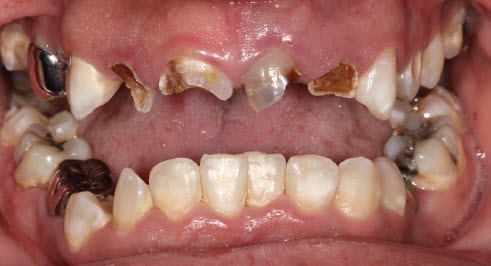
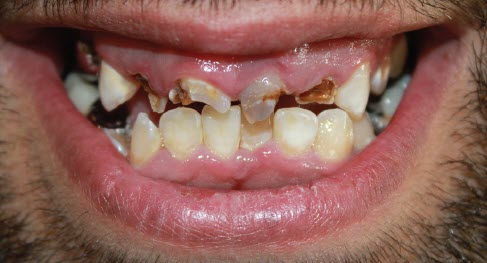
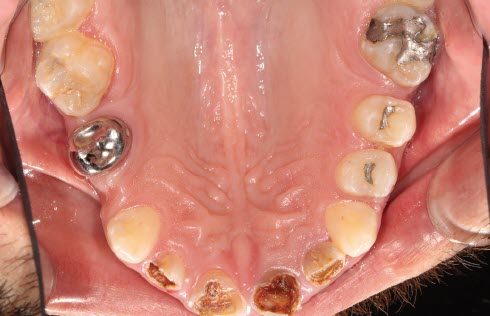
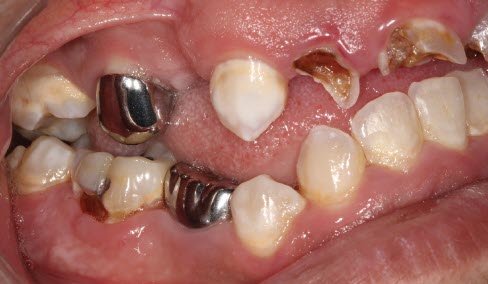
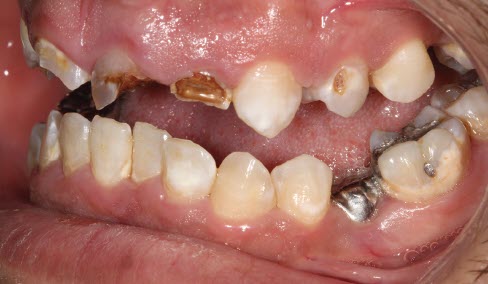
I consulted with Arrowhead Dental Laboratory in Sandy, UT, to ensure the results were predictable and possible.
After gathering this information, we developed a treatment plan and presented it to the patient. I consulted with Arrowhead Dental Laboratory in Sandy, UT, to ensure the results were predictable and possible. Together, we discussed what types of materials to use for the restorations and our goals for the occlusion.
To help establish a better plane of occlusion (over time, the patient’s occlusion had changed significantly due to missing teeth and some anterior teeth that had broken off at the gumline), a full mouth reconstruction was warranted. The patient opted for individual crown and multi-unit bridges to replace missing teeth and establish a better occlusion. In addition to this plan, we gave the patient options for dental implants.
Because his front teeth had been knocked out, other teeth grew into that space, and it affected his bite. I worked to re-establish the bite before working on anything aesthetic.
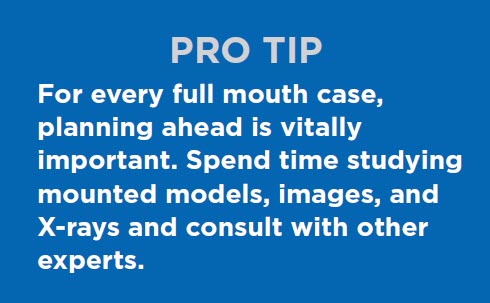
I have taken several continuing education (CE) classes on occlusion, including Everyday Occlusion with the Dr. Dick Barnes Group. Therefore, I knew to begin the patient’s treatment by taking specific measurements and finding his current Shimbashi measurement. I felt fortunate and confident when discussing his occlusion with the experts at Arrowhead before making any final decisions.
Throughout the process, we used Arrowhead’s white wax-up, prep guide, and putty matrix for the custom temporaries. After treatment-planning the case, I communicated my expectations to Arrowhead’s lab technicians.
Once the preliminary work was healed on the patient, we prepped his teeth for a full mouth rehabilitation. We decided to do all the work in one day. It was a long day. The patient came in early, and we started work around 7 a.m. We worked for more than 12 hours on his mouth. We decided to use oral conscious sedation to help the patient tolerate being in the dental chair for so long.
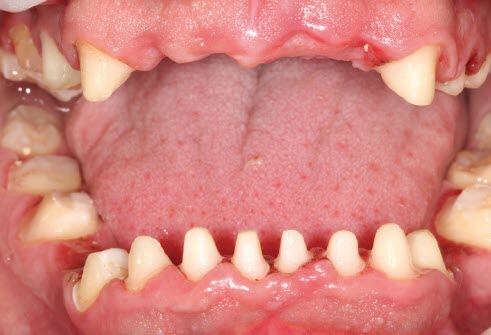
I did extractions of tooth numbers 7, 8, 9, 10, 20, and 29. Then I did bone grafts in the extraction sites to help preserve bone in that area and to try to maintain a good architecture for the pontic teeth once they were restored.
About midday, we took a break and gave the patient a protein shake to keep his blood sugar levels up. Then we went back to work and continued until about 8 p.m. By the time we finished, we had completed extractions, bone grafts, root canal therapy, and crown and bridge preparations. The patient had a new set of temporaries on his uppers and lowers, and his bite was in the correct position.
A PERMANENT NEW SMILE
For the first time in his life, the patient could smile proudly. We took a video of his wife looking at him immediately after the procedure. She held his face in her hands with tears in her eyes. Of course, everyone else in the office teared up too. Even though the patient just had on temporaries, it was rewarding to see him with a full set of beautiful, functioning teeth.
The next day, we called the patient to ensure that he was feeling okay. Somewhat surprisingly, he responded that his mouth was not sore, and he was not in any pain. The only pain he felt was “because of smiling so much.”
We did the work on a Friday, and we asked the patient to return to the office the following Monday, after the anesthesia had worn off, so we could verify his occlusion. We used articulating paper to check his occlusion and ensure everything worked properly. We planned on taking a T-Scan™ of his bite after the permanent restorations were seated and his bite settled in. But with the temps, we just wanted to make sure he was touching evenly and that nothing was off in terms of margins, contacts, or occlusion.
Even though the patient just had on temporaries, it was rewarding to see him with a full set of beautiful, functioning teeth.
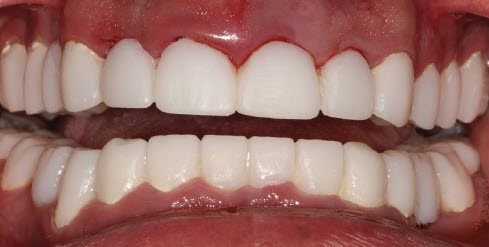
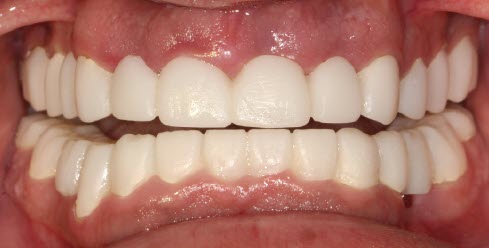
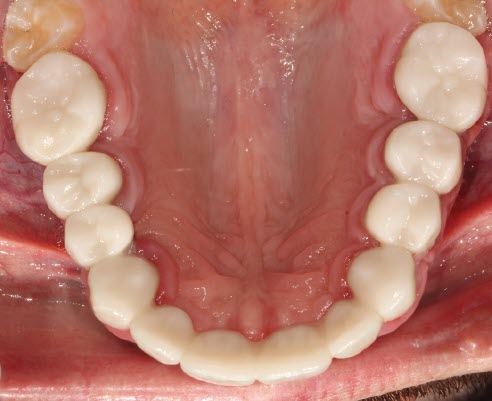
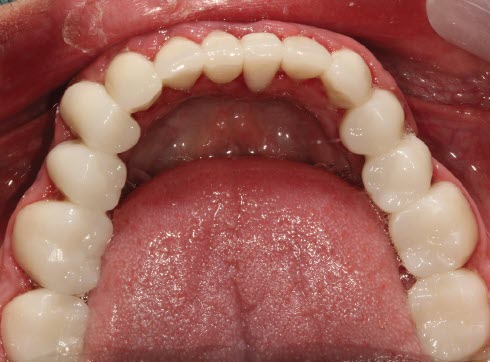
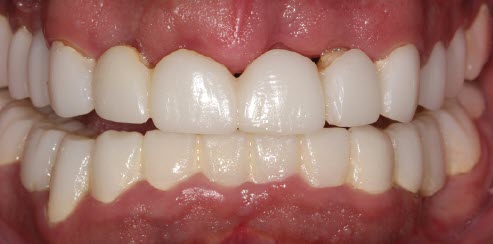
The patient remained in temps for about six to eight weeks. He wore the temporaries a little longer than we normally recommend because we wanted his soft tissue to heal as much as possible. We didn’t want him to end up with shrinkage after the final seating—where he’d get gaps or spaces between the pontic. We were patient and waited about three months before proceeding. This time allowed the patient’s soft tissue and bone to heal.
Finally, the patient returned to our practice, and we seated his finals. It was a great day and there were no surprises. My team and I went about our work, taking our time, and everything went smoothly. I give credit to Arrowhead because a lot of the pre-operative details (getting good wax-ups, measurements, and planning) were essential to the success of this case. The team at Arrowhead were a big help throughout the treatment.
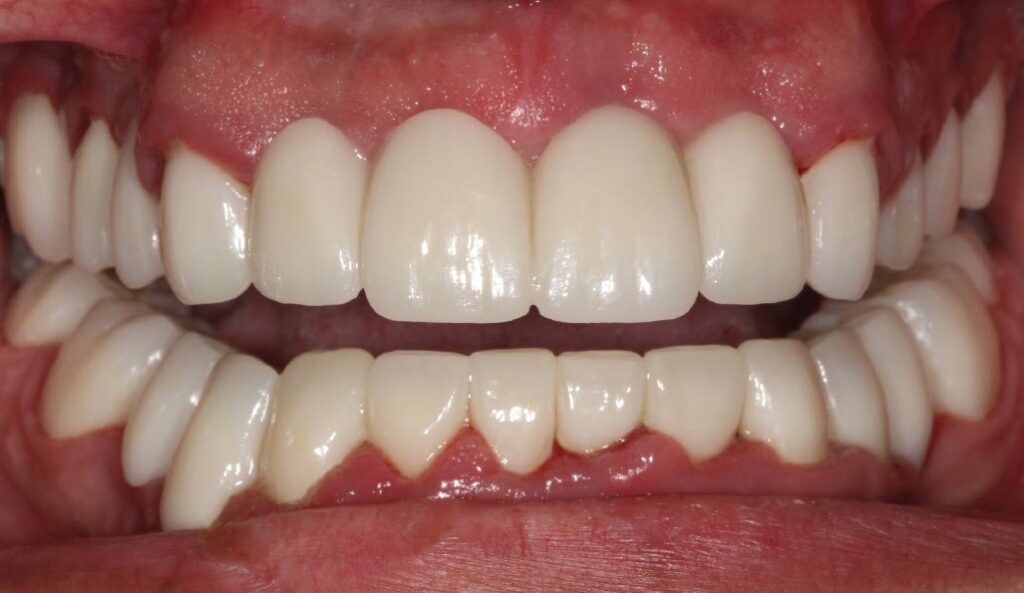
We seated the patient step-by-step using the protocol that I learned from Dr. Jim Downs in the Full Arch Reconstruction course, and it all went smoothly. I had done full mouth cases before, but never the way that Dr. Downs recommended. Now that I follow his method, it’s a lot easier and more predictable.

CONCLUSION
After the makeover, the local radio station invited the patient on the air to talk about his experience. It was fun to hear him tell the audience all about it. The patient said he felt so much more confident after receiving his new smile. He kept thanking us over and over again—telling us what a blessing it was to have a smile that he could be proud of.
Since that time, the patient has been coming in regularly for his cleaning and maintenance. My team and I educated the patient that nothing would last unless he took good care of it. The team spent a lot of time explaining the importance of home care. It’s been a great experience to see the transformation in this patient’s teeth and in his life. And personally, it was nice to help someone in need. I’d love to be able to do it again someday.



